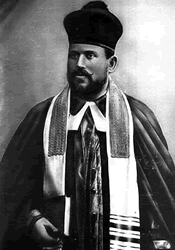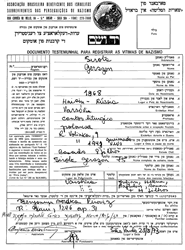Gershon Sirota
.....Gershon Sirota was born in Podolia Guberne in 1874. When just a young child, he was already helping his father, a noted cantor, to conduct services in the local synagogue. Soon his parents moved to Odessa and Gershon's wonderful voice began to become well known.
Yakovkin, cantor Yankel Seroka's choir director at the Shalashner Shul immediately offered the young Sirota a position in his choir. Shortly afterwards, Sirota was introduced to Baron Kalbos, the director of a Music Conservatory, and admitted on a scholarship. Gershon quickly made great stridges in his musical education and, as a result, was assigned larger solos in Yakovkin's choir. One Shabbat morning Sirota was asked to sing in the Shalashner Shul. After his magnificent performance he was appointed Assistant Cantor, with the salary of 100 rubels a month. It was not long before Yankel Seroka came complaining to Gershon's father that his young son ws trying to take away his position. Sirota resigned and accepted the Cantorial post at the Prikashtchikes Shul in Odessa.
In 1896 Sirota became Cantor of the famous Vilna Shtat Synagogue, where he remained for nine years. There is choir directors were Yitzchak Schlossberg, Nathan Abramson and later Leo Loew. When Leo Loew became choir director, he arranged for a special concert, in which Cantor Sirota sang with the accompaniment of a large, newly founded choir. This concert was a tremendous success and the newspapers wrote enthusiastic reviews. He and Leo Loew began to receive invitations from Bialystok, Grodno, Minsk and other Russian cities to make new concerts. Sirota's appearances were so well received and praised that Svatopolk-Mirsky, the Russian Gubernator General decided to visit the Vilna Shtat Synagogue to hear Sirota.
A few days later, the General sent a letter to the Czar's wife, Maria Feodorovna, highly praising the young cantor's talent. She requested that he perform at a concert sponsored for the benefit for the Vilna Institution for the Blind. Shortly arfterwards, Gershon Sirota was called to St. Petersburg to give a series of concerts before Czar Nicholas II. He was then asked to give yearly concerts in St. Petersburg, and Moscow by Imperial Command.
The publicity of Sirota's name soon came to the attention of the major recording companies in Europe. In 1903, twelve records of Sirota's liturgical selections were released. This event achieved for him the great honor of being the first Cantor to record his voice of phonograph records. His recordings were distributed throughout Europe and later appeared in America. The medium of these records soon made Sirota's name world famous, even though he had not yet appeared in many of the countries which his records had already reached.
Meanwhile, in Warsaw, the directors of the Tlomackie Synagogue were looking for a new Cantor. Gretzhandler, who had held the Cantorial post, was now old and the Synagogue needed a fitting successor to take his place. They offered Sirota the position because of his great popularity and Cantorial ability. He was thirty-one years old when he accepted the position, which he held for nineteen years.
In February 1912, Cantor Sirota made the first of what was to be many concert tours of America. He appeared at Carnegie Hall, The Hippodrome, and the Academy of Music in New York before making tours to the other large cities.
During 1913 he returned again on another concert tour, appearing at Kessler's Theatre, The New Star Casino, The Palace Garden, and Carnegie Hall.
His third American visit in 1921 began with an appearance at the Metropolitan Opera House, accompanied by Meyer Machtenberg's hundred voice choir. Arturo Toscanini and the famous Opera Star Joseph Schwartz were among the prominent celebrities who attended the concert.
He then conducted services in many famous Synagogues, singing for the High Holy Days at the Kalvariah Shul in Harlem. During the seasons of 1924, 1925, and 1927, he also officiated in New York for the Yamim Noraim.
When he returned to Europe (after conducting services at the Bronx Winter Garden for the Benefit of the Beit HaMidrash HaGadol of Harlem in 1927), the Tlomackie Synagogue had already chosen a Cantor to replace him. They took this action, because they were very disturbed about his constantly leaving them to daven elsewhere in America for the High Holy Days.
In 1935, Sirota became Cantor of the Norzick Shul. That year, a concert was held in his honor at the Warsaw Coliseum and he also made a trip to Israel. There he conducted services for the High Holy Days at Magrabi Theatre.
His last trip to America was made in 1938, when he davened for the Yamim Noraim in Chicago and during Succot in Milwaukee. He then returned to Europe, after receiving a telegram that his wife was critically ill in Warsaw.
With the outbreak of the war, Sirota was imprisoned in the Warsaw Ghetto with his family and the other Jews of the city. He conducted High Holy Day Services in the Warsaw Ghetto in 1941. Two years later, Cantor Gershon Yitzchak Sirota was murdered with his entire family during the destruction of the Warsaw Ghetto on the last day of Passover......
For the rest go to;
http://www.jafi.org.il/education/chazanut/cantoren/sirota..html
Source Pages of Testimony
Last Name SIROTA
First Name GERSZON
Gender Male
Date of Birth 1868
Age 75
Place of Birth HAISSIN,GAYSIN,VINNITSA,UKRAINE (USSR)
Marital Status MARRIED
Name of 1st Child JULIAN
Name of 2nd Child HELENA
Name of 3rd Child NAFTULI
Name of 4th Child ROMAN
Permanent residence WARSZAWA,WARSZAWA,WARSZAWA,POLAND
Profession CANTOR LITURGICO
Place during the war WARSZAWA,WARSZAWA,WARSZAWA,POLAND
Place of Death WARSZAWA,WARSZAWA,WARSZAWA,POLAND
Date of Death 1943
Type of material Page of Testimony
Submitter's Last Name PIROVIC
Submitter's First Name BENJAMIN
Submitter's First Name MORDKA
Registration date 23/05/1973

